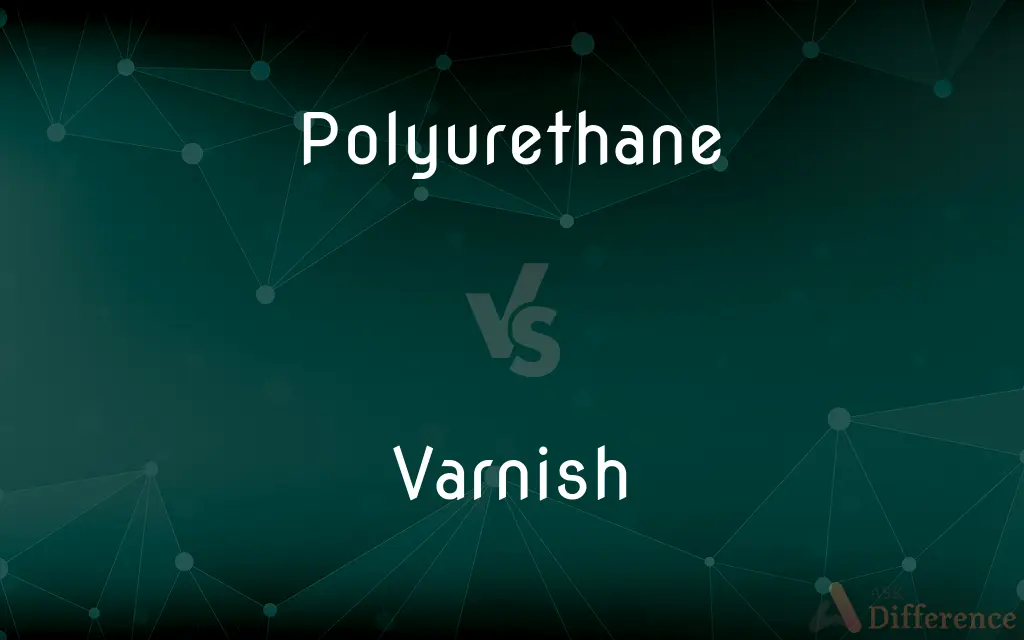Polyurethane vs. Varnish — What's the Difference?
By Tayyaba Rehman — Updated on September 23, 2023
Polyurethane is a synthetic resin used for coatings, while Varnish is a traditional protective finish derived from resins, oils, and solvents.

Difference Between Polyurethane and Varnish
Table of Contents
ADVERTISEMENT
Key Differences
Polyurethane and Varnish are both used to provide protective finishes to surfaces. Polyurethane, being a synthetic resin, offers a durable finish, often with resistance to moisture, heat, and solvents. Varnish, in contrast, is a more traditional finish that comes from a combination of resins, oils, and solvents, and it imparts a glossy appearance to the surface it covers.
The application of Polyurethane tends to result in a hard, resistant surface, suitable for floors and heavily used furniture. Varnish, on the other hand, is known for its aesthetic appeal, enhancing the natural beauty of wood grain with its transparent or semi-transparent nature.
In terms of longevity and resistance, Polyurethane typically outperforms Varnish. The chemical composition of Polyurethane ensures a long-lasting finish that can withstand daily wear and tear. Varnish, while protective, may require more frequent reapplications over time, especially in high-traffic areas.
Choosing between Polyurethane and Varnish often comes down to the desired appearance and function. For a hard-wearing surface that demands minimal maintenance, Polyurethane might be the preferred choice. However, for a more traditional, glossy finish that showcases the beauty of wood, Varnish might be selected.
Comparison Chart
Composition
Synthetic resin.
Combination of resins, oils, and solvents.
ADVERTISEMENT
Finish
Hard and resistant.
Glossy and transparent/semi-transparent.
Durability
Highly durable against daily wear.
May require reapplication over time.
Best for
Floors, heavily-used furniture.
Showcasing wood grain, traditional finishes.
Resistance
Resistant to moisture, heat, and solvents.
May be less resistant to environmental factors.
Compare with Definitions
Polyurethane
Offers durable and moisture-resistant finishes.
For the kitchen cabinets, we chose a Polyurethane finish for longevity.
Varnish
May require reapplication over time.
The hallway's Varnish coat needed refreshing after a few years.
Polyurethane
A synthetic resin used in coatings.
We applied Polyurethane to the wooden table to make it resistant to spills.
Varnish
A traditional finish for wooden surfaces.
The craftsman finished the piece with Varnish for a classic look.
Polyurethane
A modern solution for protective finishes.
Polyurethane provides a clear coat that protects the underlying wood.
Varnish
Enhances the beauty of wood grain.
Applying Varnish highlighted the rich patterns in the cedar chest.
Polyurethane
Commonly used for floors and furniture.
The Polyurethane-coated floor stood up well to daily foot traffic.
Varnish
Imparts a glossy appearance to surfaces.
The table's Varnish layer added depth and luster to its surface.
Polyurethane
Polyurethane (often abbreviated PUR and PU) is a polymer composed of organic units joined by carbamate (urethane) links. In contrast to other common polymers such as polyethylene and polystyrene, polyurethane is produced from a wide range of starting materials (monomers) and is therefore a class of polymers, rather than a distinct compound.
Varnish
Varnish is a clear transparent hard protective coating or film. It is not a stain.
Polyurethane
A synthetic resin in which the polymer units are linked by urethane groups, used chiefly as constituents of paints, varnishes, adhesives, and foams
Five coats of polyurethane
Polyurethanes serve a variety of uses
Varnish
Resin dissolved in a liquid for applying on wood, metal, or other materials to form a hard, clear, shiny surface when dry
The wood was stained with a dark varnish
Several coats of varnish
Polyurethane
Coat with polyurethane paint or varnish
The sanded and polyurethaned floorboards
Varnish
Apply varnish to
We stripped the floor and varnished it
Her toenails were varnished red
Polyurethane
Any of various thermoplastic isocyanate polymers, widely varying in flexibility, used in tough chemical-resistant coatings, adhesives, and foams.
Varnish
A liquid that contains a solvent and an oxidizing or evaporating binder and is applied to a surface to produce a hard, transparent finish after evaporation and curing.
Polyurethane
(organic chemistry) Any of various polymeric resins containing urethane links; used in very many industrial and domestic applications.
Varnish
The smooth coating or gloss resulting from the application of this liquid
Wear dulled the floor's varnish.
Polyurethane
Any polymer containing [-NH.CO.O-] linkages; such polymers are much used as the basis of light but rigid foams for packaging (polyurethane foam) and for hard coatings, as on floors.
Varnish
Something suggestive of or resembling varnish.
Polyurethane
Any of various polymers containing the urethane radical; a wide variety of synthetic forms are made and used as adhesives or plastics or paints or rubber
Varnish
An often deceptive external appearance or outward show
"people through whom a native stupidity shines forth past any varnish of education or acculturation" (Ira Sher).
Polyurethane
Resistant to heat and solvents.
The Polyurethane finish on the counter prevents damage from hot pots.
Varnish
To cover with varnish.
Varnish
To give a smooth and glossy finish to.
Varnish
To give a superficial or deceptive appearance to
Varnish the truth.
Varnish
A type of paint with a solvent that evaporates to leave a hard, transparent, glossy film.
Varnish
Anything resembling such a paint; glossy appearance.
Varnish
(by extension) A deceptively showy appearance.
Varnish
A passenger train, probably derived from the varnished passenger cars used at one time.
Varnish
(intransitive) To apply varnish.
Varnish
(transitive) To cover up with varnish.
Varnish
(transitive) To make something superficially or deceptively attractive
Varnish the report
Varnish
(transitive) To gloss over a defect.
Varnish
A viscid liquid, consisting of a solution of resinous matter in an oil or a volatile liquid, laid on work with a brush, or otherwise. When applied the varnish soon dries, either by evaporation or chemical action, and the resinous part forms thus a smooth, hard surface, with a beautiful gloss, capable of resisting, to a greater or less degree, the influences of air and moisture.
Varnish
That which resembles varnish, either naturally or artificially; a glossy appearance.
The varnish of the holly and ivy.
Varnish
An artificial covering to give a fair appearance to any act or conduct; outside show; gloss.
And set a double varnish on the fameThe Frenchman gave you.
Varnish
To lay varnish on; to cover with a liquid which produces, when dry, a hard, glossy surface; as, to varnish a table; to varnish a painting.
Varnish
To cover or conceal with something that gives a fair appearance; to give a fair coloring to by words; to gloss over; to palliate; as, to varnish guilt.
Close ambition, varnished o'er with zeal.
Cato's voice was ne'er employedTo clear the guilty and to varnish crimes.
Varnish
Paint that provides a hard glossy transparent coating
Varnish
Cover with varnish
Varnish
A protective finish made from resins, oils, and solvents.
The Varnish gave the antique chair a renewed glossy shine.
Common Curiosities
Which finish is better for highlighting wood grain?
Varnish is often preferred to enhance and showcase wood grain.
Polyurethane or Varnish?
Generally, Polyurethane is more durable and long-lasting than Varnish.
Can I apply Varnish over Polyurethane?
Yes, but proper surface preparation and compatibility checks are essential.
What is Polyurethane?
Polyurethane is a synthetic resin used in protective coatings.
What is Varnish made of?
Varnish is a blend of resins, oils, and solvents.
Can Polyurethane be used on floors?
Yes, Polyurethane is commonly used for floor finishes due to its durability.
Is Polyurethane resistant to heat?
Yes, Polyurethane typically offers resistance to heat and solvents.
What tools are best for applying Varnish?
Brushes specifically designed for Varnish application provide the best results.
Is Varnish suitable for outdoor furniture?
Yes, but ensure it's an exterior-grade Varnish designed for outdoor conditions.
How often should I reapply Varnish?
Depending on wear and environmental factors, Varnish may need reapplication every few years.
Do I need to sand between coats of Polyurethane?
Yes, light sanding between coats helps ensure a smooth finish.
Is Varnish toxic?
Some varnishes can emit VOCs (volatile organic compounds), so proper ventilation and safety measures are recommended during application.
Share Your Discovery

Previous Comparison
Autumn vs. Harvest
Next Comparison
AC vs. DCAuthor Spotlight
Written by
Tayyaba RehmanTayyaba Rehman is a distinguished writer, currently serving as a primary contributor to askdifference.com. As a researcher in semantics and etymology, Tayyaba's passion for the complexity of languages and their distinctions has found a perfect home on the platform. Tayyaba delves into the intricacies of language, distinguishing between commonly confused words and phrases, thereby providing clarity for readers worldwide.














































